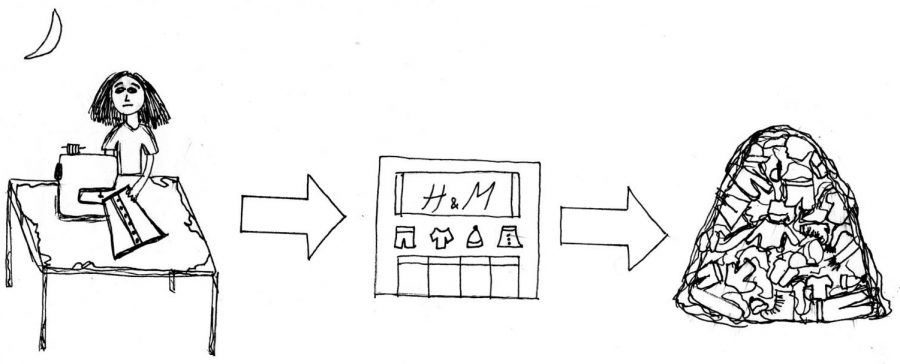Stop supporting unethical fashion
Assistant Online Editor Mariam Ibrahimi writes that supporting unethical fashion brands, we are supporting a damaging fashion industry.
May 4, 2019
Zara. H&M. Forever 21. Their show windows and racks are filled with stylish and surprisingly inexpensive clothing that make shopping feel almost like a steal. But when we swipe our cards at the register and happily walk out of the store with a bag full of clothes, rarely do we consider that these purchases support the damaging fast fashion industry.
While the overuse of plastic, toxic gases and the burning of fossil fuels are huge contributors to harming the planet, the fast fashion industry is slowly destroying the environment as well. And we are contributing to it.
After watching the 2015 documentary “The True Cost,” I was completely taken aback and shocked by how much we contribute to destroying the planet by simply purchasing clothes.
The film was created after director Andrew Morgan read about the Rana Plaza collapse in Bangladesh that cost 1,134 lives. After ignoring warning signs, the structure of an eight-story building fell apart in 2013, becoming the deadliest garment-factory accident ever. Morgan sought to find out more about the clothing industry and to unravel the truth behind the dangers of the industry. According to the documentary, a nominee of the 2015 Environmental Media Awards, the fashion industry is the world’s second largest polluter, right after oil pollution.
Now you’re probably wondering, how exactly is the fashion industry able to leave such a dent in the environment? Well, let me tell you.
Ninety-nine percent of clothes sold in the United States are imported from other countries. Take a moment to look at the tag on your shirt, pants or even your underwear. You’ll see that most of the clothing you buy is made through cheap labor in countries like China, India, Bangladesh and more.
Stores like Forever 21 are able to sell their clothes for such low prices because they are made by factory workers who earn an average of fewer than three dollars a day. According to waronwant.org, the Bangladeshi garment industry produces 80 percent of the country’s total revenue in terms of garments. Eighty-five percent of the 3.5 million workers are women. Forced to work in toxic conditions, workers are subjected to debilitating diseases and skin conditions. Some of the chemicals used to make the clothing can lead to respiratory system failure.
The fast fashion industry makes it so that this cycle of fast fashion never ends, starting from the seed that the cotton grows from. Ethically grown cotton is incredibly expensive and rare because it is simply easier for farmers to buy cheaper seeds. According to the U.S. Department of Agriculture, organic cottonseed costs from 500 to 550 dollars per ton in comparison to 80 to 175 dollars per ton for conventional cotton. Companies like Monsanto make seeds so cheap that organic cotton markets don’t even stand a chance. Monsanto is the world’s largest conventional seed company that sells seeds for an affordable price and uses pesticides that lead to an unnatural abundance. Once planted, farmers are bound to the seed forever.
Monsanto, in particular, produces seeds containing a chemical that forces land to become infertile if planted with any seed other than the Monsanto one. The same seed must be replanted or the farmer will have to recultivate the land, in turn, losing millions of dollars of profit. Monsanto’s own website says that it currently does not produce certified organic seeds.
Non-organic farmers can fill up their land of crops with synthetic fertilizer. As a result of genetically modified seeds or seeds filled with man-made chemicals, it can lead to chemical run-off into water supply, greenhouse gas emissions, among several other impacts on the environment.
In an effort to reduce harmful practices, brands like H&M have promised to use organic cotton. While H&M does say that they use organic cotton, they do not publicly indicate how much of their clothing actually uses organic cotton. Organic cotton accounts for less than one percent of all the cotton grown worldwide, so statistically, it is not plausible that a lot of H&M’s clothing would be made from organic cotton.
The fast- fashion industry has one goal: to make your clothes only last for a limited period of time so you keep buying more. Brands use the cheapest cotton to make the cheapest fabric and stitch the cheapest clothing possible. The industry forces you to keep buying things, so they can make money.
You may be wondering, “How can I, as a consumer do better?”
Many people abide by the classic concept reuse, reduce and recycle. They donate old clothes in an effort to “recycle” and buy new ones. But you must be careful, because here is where it gets worse. The thought that you can just keep buying clothes, but you’ll “donate it to charity” is actually an enormous contributor to environmental toxicity as well. According to Oxfam, only ten percent of the clothes people donate to charity or thrift stores are sold.
Many of these clothes are thrown into landfills where the chemicals such as nonylphenol ethoxylates (NPEs) that were used to make them rise into the air or mix with bodies of water, thus making both the air and water toxic. The rest of these donated clothes are often shipped to developing countries like Haiti where they are sold in flooding markets. This is not beneficial because it only destroys their local economy. There is a surplus of clothes, and local businesses are unable to sell their products because there are so many cheaper imports.
The fashion industry has become a cycle of never-ending pesticides, chemicals and toxins that are destroying global economies, harming our water and the air we breathe and causing physical debilitations to the people who make the clothes.
Here is what you can do. I know it seems difficult, but we need to stop buying clothes from companies that employ cheap labor and allow unethical sourcing. Before you buy clothes, learn about the company’s background and educate yourself about what you are purchasing. Find companies that ethically source clothing and support work that is not a result of sweatshops and deadly conditions. Find companies in the U.S. that have ethically sourced their entire clothing brand: from cotton seed to the final product. Imported product is not always a result of cheap labor, but always research first! Some affordable, but ethical brands include Everlane, PACT, thredUP and Kotn.
Companies with ethical practices are expensive, but remember that you do not need to buy a surplus of clothes. Buy only what is necessary. The industry has conditioned us to believe that we need to keep buying new clothes. Because the clothing will be of better quality, you will have it for a longer time. Spending more on less that is of higher quality is more sustainable for the environment and your pocket in the long run.
Even better than buying new clothes, buy clothes from thrift stores, those that are second- hand, so that you reuse clothing. Do your research to learn about the benefits of sustainable fashion that is just a simple, but crucial, way to contribute to a cleaner environment.











Ayesha's Collection • Aug 16, 2024 at 5:59 am
The allure of affordable, trendy clothes from brands like Zara and H&M masks a sobering truth: our shopping habits significantly impact the environment. The 2015 documentary The True Cost unveils the stark reality behind our clothing, revealing how the fast fashion industry contributes to environmental degradation and human suffering. As we admire those stylish pieces, it’s crucial to remember the broader cost and seek more sustainable choices that honor both our planet and its people.